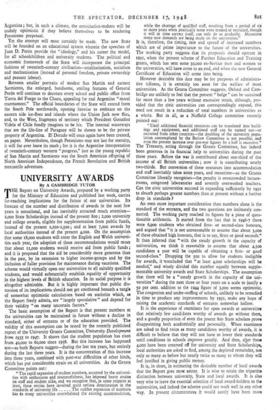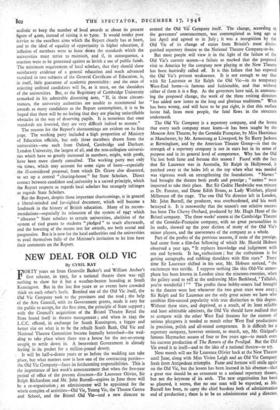UNIVERSITY AWARDS
By A CAMBRIDGE TUTOR
THE Report on University Awards, prepared by a working party for the Ministry of Education and published last week, carries far-reaching implications for the future of our universities. Its forecast of the number and distribution of awards in the next few years is sensational, and has inevitably attracted much attention- 2,000 State Scholarships instead of the present 800 ; 2,000 university and college awards, eligible for supplementation from public funds, instead of the present 1,200-1,500; and at least 7,000 awards by local authorities instead of the present 4,000. On the assumption
that some 18,000 students will enter the English and Welsh universi- ties each year, the adoption of these recommendations would mean that about it,000 students would receive aid from public funds ; and it is proposed that the aid be considerably more generous than in the past, by its extension to higher income-groups and by the inclusion of fuller provision for maintenance during vacations. The scheme would virtually open our universities to all suitably qualified students, and would substantially establish _equality of opportunity in the highest levels of British education. In its social purpose it is altogether admirable. But it is highly important that public dis- cussion of its implications should not get smothered beneath a tangle of somewhat optimistic calculations based on statistics which, as the Report freely admits, are "largely speculative" and depend for their validity "on many uncertain factors." The basic assumption of the Report is that present numbers at the universities can be maintained in future without a decline in standard, either of entrants or of the education provided. The validity of this assumption can be tested by the recently published report of the University Grants Committee, University Development from 1935 to 1947. It shows that the student population has risen from 4o,000 to 6o,000 since 1938. But this increase has happened not—as both Reports suggest—during the last ten years, but entirely during the last three years. It is the concentration of this increase into three years, combined with post-war difficulties of other kinds, which has put considerable strain on all universities. As the Grants Committee points out: "The rapid expansion of student numbers, accepted by the universi- ties with enthusiasm and resourcefulness, has imposed heavy strains on staff and student alike, and we recognise that, in some respects at least, these strains have involved quite serious deterioration in the standards of university life ..... The sudden expansion of numbers has in many universities overwhelmed the existing accommodation, while the shortage of qualified staff, resulting from a period of six or more years when practically none were trained or recruited, though it will in time correct itself, can only do so gradually. Meantime many new demands are being made on the universities." It is, therefore, the timing, rate and spread of increased numbers which are of prime importance to the future of the universities. The working party suggests that its proposals should operate in 1951, when the present scheme of Further Education and Training grants, which has sent some 3o,000 ex-Service men and women to the universities, will have come to an end, and when the new General Certificate of Education will come into being.
However desirable this date may be for purposes of administra- tive tidiness, it is certainly too soon for the welfare of most universities. As the Grants Committee suggests, Oxford and Cam- bridge are unlikely to feel that the present " bulge " can be sustained for more than a few years without excessive strain, although, pro- vided that the civic universities can correspondingly expand, this need not result in a reduction of total numbers in universities as a whole. But in all, as a Nuffield College committee recently pointed out: " Until additional financial resources can be translated into build- ings and equipment, and additional staff can be turned out—or recruited from other countries—the doubling of the university popu- lation contemplated by the Barlow Committee is not possible, and even the present increase over pre-war figures by a half is excessive." The Treasury, acting through the Grants Committee, has indeed been generous in its financial help to universities during the past three years. Before the war it contributed about one-third of the income of all British universities ; now it is contributing nearly two-thirds. But conversion of these resources into accommodation and staff inevitably takes some years, and meantime—as the Grants Committee liberally recognises—the _ penalty is overcrowded lecture- rooms, congested laboratories and severely overworked teachers.
Can the civic universities succeed in expanding sufficiently by 1951 to absorb perhaps greater numbers than at present without a further drop in standards ?
An even more important consideration than numbers alone is the standard of the entrants, and the two questions are intimately con- nected. The working party reached its figures by a piece of ques- tionable arithmetic. It started from the fact that in 1946-7 there were 6,90o students who obtained first- or second-class honours, and argued that "it is not unreasonable to assume that about 3,000 of these obtained high honours, that is to say, firsts or good seconds." It then inferred that "with the steady growth in the capacity of universities, we think it reasonable to assume that about 4,500 candidates a year will be capable of obtaining a first- or good second-class." Dropping the 5oo to allow for students ineligible
for awards, it -concluded that "at least 4,000 scholarships will be needed," and wisely divided this number equally between supple- mentable university awards and State Scholarships. The assumption that there will be a "steady growth in the capacity of the uni- versities" during the next three or four years on a scale to justify a 50 per cent, addition to the 1944 figure of 3,000 seems optimistic.
The congestion and under-staffing of schools, unlikely to be remedied in time to produce any improvements by 1951, make any hope of raising the academic standards of entrants somewhat hollow.
It is the experience of examiners for open awards at universities that relatively few candidates worthy of awards go without them, and a goodly proportion of even the preent 800 State scholars prove disappointing both academically and personally. When examiners are asked to find twice as many candidates worthy of awards, it is difficult to believe that they will not have to lower their standards until conditions in schools improve greatly. And then, af;er these 4,000 have been creamed off for university and State ScholarshiPs, local authorities are asked to find, among the depleted remainder, not only as many as before but nearly twice as many to whom they will feel justified in giving public money.
It is, in short, in estimating the desirable number of local awards that the Report goes most astray. It is wise to retain the tripartite distinction between university, State and local awards. It is also very wise to leave the essential selection of local award-holders to the universities, and indeed the scheme could not work well in any other way. In present circumstances it would surely have been more 'realistic to keep the number of local awards at about its present 'figure of 4,000, instead of raising it to 7,000. It would render poor se' rvice to the excellent aims which the Report clearly has at heart, and to the ideal of equality of oppornmity in higher education, if inflation of numbers were to force down the standards which the universities must strive to maintain, and if, in consequence, a reaction were to be generated against so lavish a use of public funds. The minimum requirement of local scholars, that they should show satisfactory evidence of a general education and reach advanced standard in two subjects of the General Certificate of Education, is, in itself, little guarantee of academic potentiality : and the onus of rejecting unfitted candidates will lie, as it must, on the shoulders of the universities. But, as the Registrary of Catribridge University remarked in his admirable dissenting note, "If, in these circum- stances, the university authorities are unable to recommend for awards as many candidates as the Report contemplates, it is to be hoped that there will be no feeling that they are placing unjustifiable obstacles in the way of deserving pupils. It is notorious that once standards are lowered, they are very difficult indeed to restore."
The reasons for the Report's shortcomings are evident on its first page. The working party included a high proportion of Ministry of Education officials, but only three members drawn from the universities—one each from Oxford, Cambridge and Durham. London University, the largest of all, and the non-collegiate universi- ties which have so greatly increased in numbers, might, with profit, have been more closely consulted. The working party met only six times, which may account for some signs of haste—especially the ill-considered proposal, from which Dr. Grave also dissented, to set up a central "clearing-house" for State Scholars. Direct contact between candidate and university is a sacred principle, which the Report respects as regards local scholars but strangely infringes as regards State Scholars.
But the Report, despite these important shortcomings, is in general a liberal-minded and far-sighted document, which will become a landmark in the history of British education. Many of its recom- mendations—especially its relaxation of the system of I947 which " allocates " State scholars to certain universities, abolition of the system of tied grants to students " pledged " to teach afterwards, and the lowering of the means test for awards, are both sound and progressive. But it is now for the local authorities and the universities to avail themselves fully of the Minister's invitation to let him have their comments on the Report.



































 Previous page
Previous page